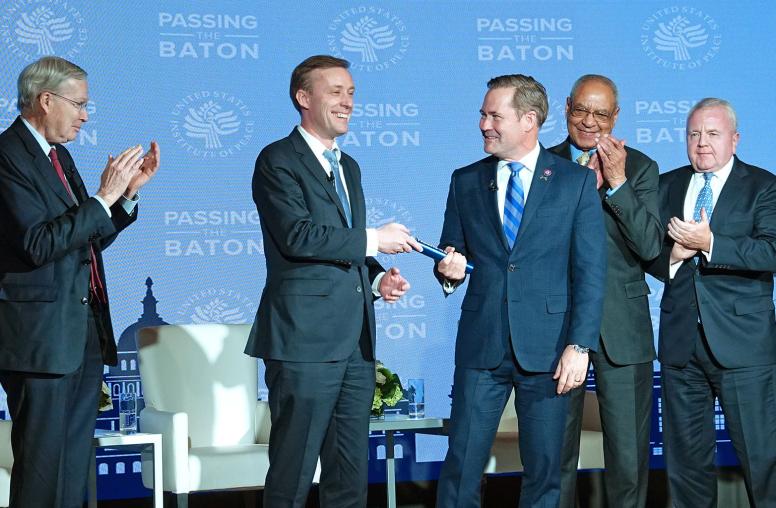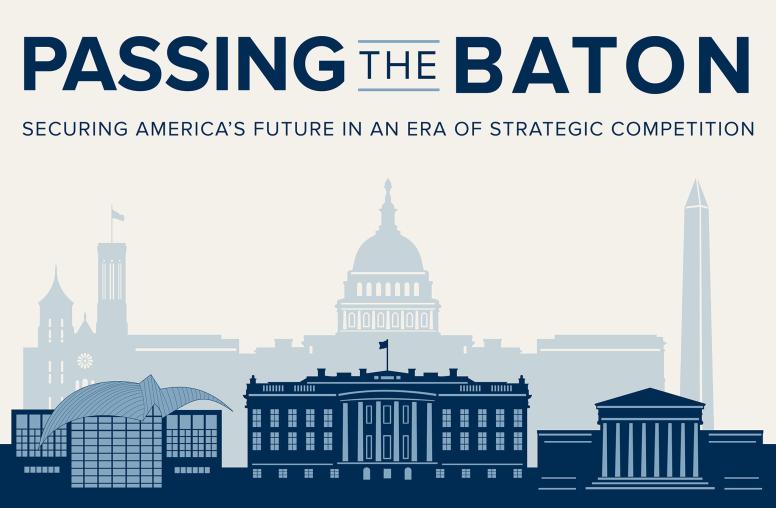Former National Security Adviser Stephen J. Hadley Addresses U.S.-China Relations During Trip to Beijing and Calls for New Phase
In a luncheon address at the 3rd U.S.-China Project on Crisis Avoidance & Cooperation Track 1.5 conference in Beijing, former national security adviser and current senior adviser for international affairs at the United States Institute of Peace, Stephen J. Hadley, spoke about U.S.-China relations 30 years after the establishment of full diplomatic relations.
For Immediate Release, March 15, 2010
Contact: Lauren Sucher, 202/429-3822 or lsucher@usip.org
In a luncheon address at the 3rd U.S.-China Project on Crisis Avoidance & Cooperation Track 1.5 conference in Beijing, former national security adviser and current senior adviser for international affairs at the United States Institute of Peace, Stephen J. Hadley, spoke about U.S.-China relations 30 years after the establishment of full diplomatic relations. Hadley praised both nations for progress in the relationship but warned that U.S.-China relations are entering "a complex period of enormous promise, yet also of enormous peril." Citing the numerous global challenges of economic growth, energy, the spread of weapons of mass destruction, humanitarian disasters, terrorism and poverty, Hadley argued that it is in China’s interests that solutions be found to these problems, since only by solving these problems is China going to be able to achieve its own domestic, economic, social and political agenda.
"In order to move to a new phase in our relationship," Hadley said, "we need to change the way we think about U.S.-China relations."
"To use an American expression, when it comes to China-U.S. relations, we focus too much on the glass being half empty, without acknowledging that this means the glass is also half full." Hadley argued that the key to achieving the full potential of U.S.-China relations is for the two nations to work together and with the rest of the international community to solve the global challenges that threaten the interests of all states--including China and the United States.
Hadley outlined a series of questions and concerns about Chinese behavior ranging from its deployment of military capabilities in the Western Pacific that seem designed to exclude the forces of nations like the United States, concerns that China will use its power to pressure its neighbors, its mercantilist approach to the developing world, its uncertain embrace of long-term partnerships with foreign companies and investors, and the question of whether or not China will pressure Iran and North Korea to forego nuclear weapons programs. He suggests steps that China could take to reassure the world about these concerns including resuming and expanding military-to-military exchanges, dismantling of missiles deployed adjacent to the Taiwan Strait, hiring and training local workers in developing countries, protecting intellectual property of foreign investors, and contributing to the national security challenges posed by proliferating states, failed and failing states, and terrorist groups. "If China can make these commitments, it will not only establish a constructive partnership with the United States, it will become a respected leader in the world of the 21st century," said Hadley.
About USIP
USIP is an independent, nonpartisan, national institution established and funded by Congress. Its goals are to help:
- Prevent and resolve violent international conflicts
- Promote post-conflict stability and development
- Increase conflict management capability, tools, and intellectual capital worldwide.
About Stephen J. Hadley
Stephen J. Hadley is senior adviser for international affairs at the United States Institute of Peace and a member of the board of directors of The Atlantic Council.
Stephen Hadley completed four years as the assistant to the president for National Security Affairs on January 20, 2009. In that capacity he was the principal White House foreign policy adviser to then President George W. Bush, directed the National Security Council staff, and ran the interagency national security policy development and execution process.
From January 20, 2001 to January 20, 2005, Hadley was the assistant to the president and deputy national security adviser, serving under then National Security Adviser Condoleezza Rice. In addition to covering the full range of national security issues, Hadley had special responsibilities in several specific areas including U.S. relations with Russia, the Israeli disengagement from Gaza, developing a strategic relationship with India and ballistic missile defense.
About the U.S.-China Project on Crisis Avoidance & Cooperation
The U.S.-China Project on Crisis Avoidance & Cooperation (PCAC) is a Track 1.5 project run by the Center for Conflict Analysis and Prevention at the U.S. Institute of Peace. Together with its Chinese partners – the China Institutes of Contemporary International Relations and Fudan University’s Center for American Studies – the Institute brings together U.S. and Chinese officials for closed discussions on a host of security, political, economic, financial and environmental issues. PCAC’s key objectives are: (1) To foster deeper mutual understanding of traditional and nontraditional security issues that could have significant unintended consequences for U.S.-China relations, and (2) To exchange views on how to address these pressing policy issues. By facilitating joint "policy R&D" analytical work on these issues, the Institute seeks to increase mutual understanding between U.S. and Chinese participants and inform the development of policies. John S. Park, senior research associate in the Center for Conflict Analysis and Prevention, is co-director of PCAC.
Explore Further
- Read the full text of Hadley's speech (PDF - 120 KB)



